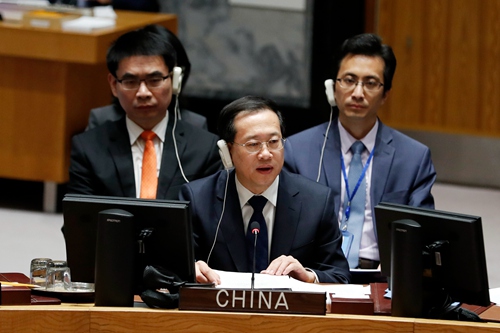| Statement by Ambassador MA Zhaoxu at the Security Council Debate on UN Peacekeeping Operations |
| 2018-03-28 22:21 |
|
China thanks the presidency of the Netherlands for convening today’s open debate, and welcomes you, Prime Minister Rutte, to the Council. I would also like to thank the Secretary-General and Mr. Moussa Faki Mahamat, Chairperson of the African Union, for their briefings. I have also listened carefully to the statement by Ms. Touré. I would first like to pay full tribute to the peacekeepers around the world who are serving in the cause of peace. In the 70 years of the history of United Nations peacekeeping operations, these missions have made an enormous contribution to the maintenance of peace and security. In recent years, they have been faced with more complex environments and mandates, with ever-increasing asymmetric security risks and peacekeeper casualties. Their continually expanding mandates are supported by only limited resources, and Member States and the Secretariat should work together to help the peacekeeping operations adapt in the light of the constantly evolving situations on the ground. China is determined to participate actively in the reform of the United Nations peace and security architecture and internal management, and will work together with all the relevant parties to improve the capabilities of United Nations peacekeeping operations to maintain world peace. First, it is important to adhere to the purposes and principles of the Charter of the United Nations and the fundamental principles guiding our peacekeeping operations. That is both a prerequisite of and a guarantee that the missions can conduct their work effectively and win the trust of host countries. It is important to fully respect the sovereignty of host countries, strengthen communication with them and, based on a response to their real needs, help them achieve peace and stability and enhance their capacity-building in that regard. It is important to avoid arbitrarily taking over responsibilities that fall under the purview of national sovereignty. Secondly, Security Council mandates must be explicit and feasible, and have a clear focus. The Council must give priority to political settlements, focus on the core tasks of peacekeeping and take into full consideration the situation on the ground, the resources available, the capacities of troop-contributing countries and other important factors. The priorities and core tasks must be adjusted in a timely fashion as the situation dictates. In due course, workable exit strategies must be formulated, if the conditions allow and the host countries request it. Troop-contributing countries must be given more opportunities to take part in the discussion as mandates are developed and adjusted, which will also help to improve them. Thirdly, it is important to strengthen the support and guarantees that the Secretariat provides to peacekeeping operations. The logistical support for peacekeeping operations must be optimized so as to ensure the maximum effectiveness of the resources allocated to them. Both the Secretariat and the peacekeeping missions should prioritize the safety and security of peacekeepers by establishing rules in that regard, enhancing the in-house monitoring and analysis of the local security situation, improving early-warning capabilities and internal information-sharing on potential security threats and ensuring that funds and equipment are available for the purpose. It is important to enhance and guarantee medical capabilities, particularly for medical treatment and evacuation during emergencies. Fourthly, it is crucial to enhance troopcontributing countries’ capacity-building and to expand partnerships with regional organizations. The international community should take the real needs of troop-contributing countries, especially when they are developing countries, into full consideration. Their capacity-building in peacekeeping must be strengthened. It is also important to ensure targeted training and resources for peacekeeping operations. Attention and support must be given to the African Union and other regional and subregional organizations that are playing an important role in the maintenance of international peace and security in Africa. The African Union must be assisted so as to enable it to establish the African Standby Force and quick reaction force as soon as possible. China supports African Union’s proposal on funding for African peace support operations and hopes to see details on the African Union-led peacekeeping operations. China has actively participated in United Nations peacekeeping operations and has made major contributions. We are the second-largest troopcontributing country among Security Council members and the second-largest financial contributor to United Nations peacekeeping budget, with more than 2,500 Chinese peacekeepers now deployed in 10 missions, including those in South Sudan, Mali, the Democratic Republic of the Congo and Darfur of Sudan. In the face of complex security situations and difficult natural conditions, they are working diligently to maintain peace and protect local civilians, and winning praise for the United Nations and its peacekeeping operations. China is actively honoring the commitment that our President, Xi Jinping, announced to United Nations peacekeeping operations. We have established a peacekeeping standby force of 8,000 troops and two standby peacekeeping police units, and have completed their registration in the United Nations Peacekeeping Capability Readiness System. We have sent our first helicopter squad to a United Nations peacekeeping operation in Africa and are giving the African Union active military assistance. The China-United Nations Peace and Development Fund views peacekeeping capacity-building as a priority area, through which it aims to assist the United Nations in enhancing the safety and security of peacekeepers and supporting developing countries, particularly African countries, in building their peacekeeping capacities. Last but not least, China is ready to work with other Member States to further improve United Nations peacekeeping operations so that the world can enjoy lasting peace and universal security. |
| |||||||||||||
| |||||||||||||
